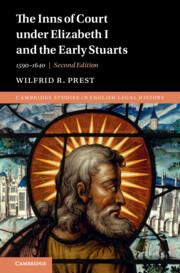Book contents
- The Inns of Court under Elizabeth I and the Early Stuarts
- Cambridge Studies in English Legal History
- The Inns of Court under Elizabeth I and the Early Stuarts
- Copyright page
- Contents
- Figures and Tables
- Preface to the First Edition
- Acknowledgements
- Abbreviations
- Introduction to the Second Edition
- 1 Dimensions
- 2 The Quality of Membership
- 3 Ranks of Membership
- 4 Administration and Government
- 5 Discipline and Disorder
- 6 Learning the Law
- 7 Legal and Liberal Education
- 8 Papists
- 9 Preachers, Puritans and the Religion of Lawyers
- 10 The Inns of Court and the English Revolution
- Book part
- Glossary
- Note: Archives and Manuscripts at the Inns of Court
- Index
4 - Administration and Government
Published online by Cambridge University Press: 15 January 2023
- The Inns of Court under Elizabeth I and the Early Stuarts
- Cambridge Studies in English Legal History
- The Inns of Court under Elizabeth I and the Early Stuarts
- Copyright page
- Contents
- Figures and Tables
- Preface to the First Edition
- Acknowledgements
- Abbreviations
- Introduction to the Second Edition
- 1 Dimensions
- 2 The Quality of Membership
- 3 Ranks of Membership
- 4 Administration and Government
- 5 Discipline and Disorder
- 6 Learning the Law
- 7 Legal and Liberal Education
- 8 Papists
- 9 Preachers, Puritans and the Religion of Lawyers
- 10 The Inns of Court and the English Revolution
- Book part
- Glossary
- Note: Archives and Manuscripts at the Inns of Court
- Index
Summary
The first section (‘Centralisation’) traces the consolidation of authority in the hands of the benchers, whose internal supremacy appears to have been of fairly recent origin, and the growing interest of Elizabethan governments in the societies, with the effect of strengthening the benchers’ powers. Before the great expansion of membership, most of the routine administrative chores necessary to keep the societies operating on a day-to-day basis were undertaken by members themselves. But thereafter there was increasing reliance on salaried officers or servants (‘Bureaucratisation’), especially the creation of full-time administrative positions to assist the nominal temporary head of each society, the treasurer. On-going provision of catering and lodging depended on a continuously expanding domestic establishment. However the inns had both a ‘Servant Problem’, and a ‘Management Problem’. Servants depended for much of their income on tips and perquisites, leading to various conflicts of interest, while much of the responsibility for overseeing the societies’ affairs was shouldered by a small minority of benchers. The chapter concludes with a glance at difficulties experienced in managing the societies’ finances, which encouraged the commutation of former academic requirements into cash payments.
Keywords
- Type
- Chapter
- Information
- The Inns of Court under Elizabeth I and the Early Stuarts1590–1640, pp. 100 - 122Publisher: Cambridge University PressPrint publication year: 2023

